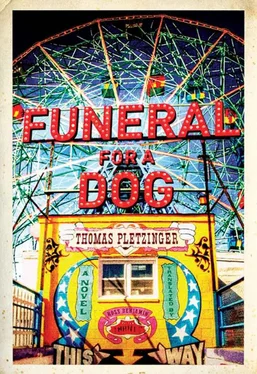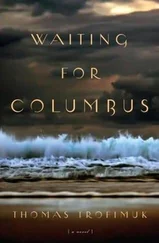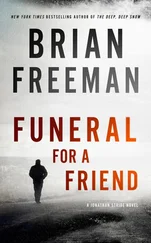Manteli and I are staying here!
He should make the best decision for Lua on his own. Svensson hesitates and looks first at Tuuli, then at me. Svensson nods, he seems to have more important things on his mind, his eyes tear. He turns the gas lever, the screw stirs the water. He steers Macumba in the same wide curve as yesterday around the rock shelf (he knows his lake). The swan takes a running start and soars into the air after ten, maybe twenty slapping steps on the water’s surface. The bird’s squawks and the noise of the motor can still be heard when the boat itself has long been out of sight. What remains are: the cicadas, the pigeon droppings, Tuuli and I.
buoy 1477
The water splashes up over me. I open my eyes and see green. I plunge and count the breaths, 27, 28, below me the dark green, above me the light. At 29 my air is running out. I manage another six or seven increasingly rapid strokes, then comes the dizziness, then I have to surface. When I turn toward the shore, the ruined house is reflected in the smooth water. The midday sun flings itself over the green of the sycamores and palms, over the rampant vines on the walls (the oleander is shining). Tuuli is nowhere to be seen, she must have gone inside after Svensson’s departure, and the cypresses are blocking my view of the door. I want to swim to the white buoy, I want to catch my breath. But as I’m about to reach for the metal ring, the water between buoy 1477 and me breaks apart, a watery spraying and slapping, a bright thrashing, I paddle backward and kick around me, I don’t hit anything. Then it’s over. Only a few bubbles on the surface and several seconds of complete silence. I hold on to the mossy buoy, I rub the water out of my eyes (around buoy 1477 dance mosquitoes). The fish down there are white and insanely beautiful, Svensson said, and I think I see a bright shadow plunging away below me. The passing thought of calling for help, but no one would hear me (I’m alone with the monster of Lago Ceresio, I think). But then there’s a soft splash, and behind me Tuuli says,
You almost got me, Manteli !
Her hand grasps my shoulder before I can even turn my head. Tuuli holds on to me and buoy 1477, I paddle with my legs. We’re alone, she says, Karvasmanteli . I’m sorry, I say, I didn’t mean to hit you (her skin underwater, the fabric of her green bikini is missing). That’s fate, says Tuuli, you hit what you’re supposed to hit.
Interview (1477)
MANDELKERN: I thought you were Moby Dick.
TUULI: That’s a strange mix-up.
M: I thought a fish was attacking me.
T: You were almost about to kill me.
M: I would have caught you and then thrown you back. You’re far below the permissible catch weight.
T: Is this a fishing lesson, Manteli ?
M: We’re clinging to the buoy here side by side, I would only have to turn around.
T: So turn around.
M: The water is much warmer than I expected.
T: Only on the surface. What’s your wife’s name, Manteli ?
M: Elisabeth.
T: Why don’t you wear a ring?
M: The ring is upstairs on the desk. We’re swimming around here. I could lose it.
T: It’s a ring, Manteli . You’re getting almost as dramatic as Svensson.
M: It’s a lake. And apparently it’s deep.
T: Shall we swim back, Manteli?
Oscar and Corner Store Oscar
Tuuli and I still side by side holding on to buoy 1477, we don’t swim back. The wind is getting stronger. When I try to change the subject and ask about the vet, about Lua, his leg and his faithfulness, Tuuli answers that she once knew someone, his name was Corner Store Oscar, in the last days of the Vietnam War he had to be retrained as a medic. The guy from Svensson’s manuscript? I ask, and Tuuli laughs at me and my curiosity. Yes, from Lorimer Street, she says, Corner Store Oscar really liked Lua (our Lua, she says). Instead of a theoretical training each of the candidates had to go out one afternoon and shoot a dog in the street. The soldiers waited next to a garbage dump on the outskirts of Hanoi for the hungry street mutts. The animals weren’t allowed to die, each soldier had only one shot. The medics were supposed to aim for the extremities or the underside, typical wounds comparable to those of people. After the shot the shooter had to rush immediately to do first aid on the most severely wounded animal. The others could take this opportunity to perform a simulation of covering fire. Each animal was given the name of its shooter, each shooter ministered to and took care of his victim from that point on. The surviving dogs quickly befriended the medics. Shortly before the dogs recovered, the medics had to tear open their wounds again, rub salt, shards and latrine contents in the leg and stomach wounds so they got infected. Then these infections were themselves treated for training purposes, in further training steps came fevers, gangrene and emergency amputations. But meanwhile the animals’ faithfulness grew, they no longer left their medics’ sides, they followed their torturers wherever they went. Dogs stay with the people who hurt them the most. That’s why the camp was full of medics and dogs of the same name with compresses, casts and splinted legs, Fred Smith and Freddy, Jack White and Jack Black, Corner Store Oscar and Oscar, says Tuuli, and we laugh, our heads half underwater, half above the surface. In the end there was often a tacit euthanasia, that is, the stepping up of the symptoms until death. There were also soldiers, Tuuli recounts, who simply opened their animals’ veins, even though that was punishable by several days’ arrest. Corner Store Oscar ultimately killed Oscar out of pity with a shot in the head, declared his training finished, and the next day was immediately sent back to the front, where his lower jaw was accidentally shot off on the second morning by a soldier of his own unit (friendly fire, says Tuuli). But that dog follows Corner Store Oscar to this day, you see, Oscar the dog remains faithful to Oscar the man beyond the grave. Lua, she says, is exactly the same way. I ask whether those were really tears in Svensson’s eyes before, as we were lifting the dog onto the boat. No, says Tuuli, rubbing the water out of her eyes, no, no, she says, no. Then she lets go of the buoy and plunges under me toward the shore, I swim after her (I can’t do the crawl).
William Wordsworth & Robby Naish (2005–2005)
In front of Tuuli lies the plucked and gutted rooster. This is Wordsworth, she says, taking the biggest knife from the knife block and the whetstone from the hook, Naish has been in the soup since yesterday. Did you hear the screams, Manteli? Yes, I did. We came directly into the kitchen, Tuuli’s standing in her puddle of lake water, I in mine (both wrapped in towels). It was loud enough, I say, and the soup was good, it was just what I needed in my condition. Tuuli sharpens the knife, which is almost as long and wide as her delicate forearm. Svensson didn’t hit Naish’s neck precisely, she explains, that happens to him often, that he doesn’t hit things precisely and thus causes pain, instead of — for example, when slaughtering the white rooster Robby Naish — dealing with things as quickly and as painlessly as possible for all concerned parties. Tuuli checks the blade, then she continues to sharpen it and looks me directly in the eyes (her fingertip on the bare metal). Once the knife is sharp enough, she pulls open Wordsworth’s wings and lays bare the rooster’s belly and breast. Hold tight, she commands, and because I’ve already marveled at her nimble fingers when she was filleting the fish, I press the cold wings down on the tabletop. Tuuli holds the knife between her teeth and takes a water glass out of the cabinet. Svensson must have gotten the bottle of vodka at the supermarket yesterday, and since the fuse has been reset, there are ice cubes again. Tuuli puts the glass between me and the rooster. She asks whether I’ve read all of Astroland , whether I believe such stories? Not all of it, I say, but the part with the vodka. At that Tuuli taps lightly on the glass with the blade.
Читать дальше












